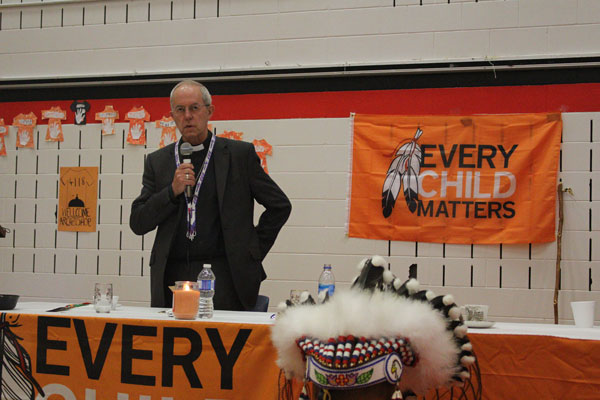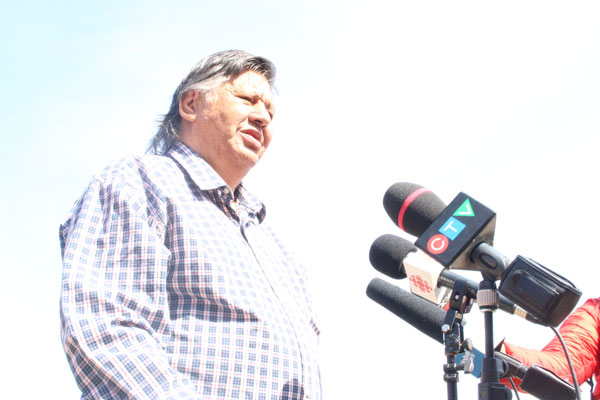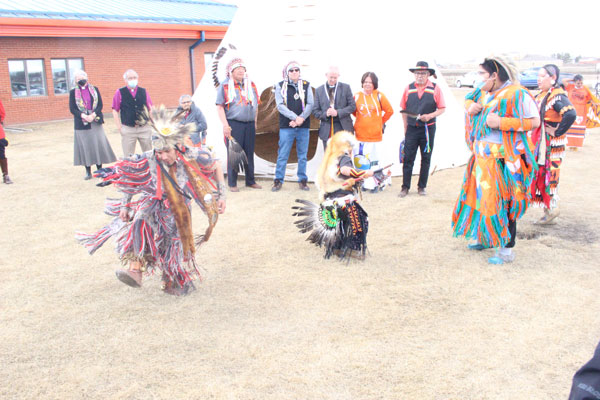
After spending an afternoon listening to stories from residential school survivors the spiritual head of the Anglican Church apologized for the church’s role in the system at Bernard Constant Community School on James Smith Cree Nation on Saturday.
Justin Welby apologized after hearing stories of abuse and neglect at various Anglican-run schools.
“I am sorry. I am more sorry than I can say. I am ashamed. I am horrified,” Welby said. “I ask myself where does that come from, that evil, it has nothing, nothing to do with Christ. It is the lowest, wickedest, most terrible thing to molest a child while reading the Bible. How can a human being do that and look themselves in the eye? I am so, so, so very sorry.”
Before his apology, Welby described the bravery of the many survivors who spoke throughout the afternoon.
‘I think what you have done—and this is what takes so much courage—is you have opened a window into hell and you have called us to look into hell where you were,” Welby said.
“The difference about that bit of hell is it was built by the church and in the name of the church,” he added.
Dennis Sanderson of the Chakastaypasin Band on the James Smith Cree Nation went to Gordon’s residential school for 11 years starting in 1965. He was one of 14 children in the family who all went to residential school.

“Throughout those years in Gordon’s we suffered a lot of abuse,” he remembered.
“It was a hard journey for me, a young boy, probably eight years old or seven years old when I went to residential school. (I) suffered a lot of abuse at Gordon’s. It was a terrible thing, terrible now to think about it.”
In order to heal, Sanderson became a pipe carrier and pow wow dancer. He also took part in the Grand Entry on Saturday.
“I’m an elder now because I went into my cultural lifestyle. That’s the way I dealt with my anger,” he explained.
“For the Anglican church to say I’m sorry, for the Roman Catholic Church to say I’m sorry, I accept that because I grew up to forgive—in the later years of my life—to forgive what was given to me, to forgive what was taken from me, the abuse, the sexual abuse, many things that happened to me. It hurts,” Sanderson said.
Survivor Rhonda Sanderson, who attended the Prince Albert Indian Residential School after it was no longer under church control shared her story with the Archbishop in order to educate him on her story, her parents story and her grandparents story.
“The churches have to start accepting responsibility and apologize for the atrocities that happened in residential school,” Rhonda said. “Today was a monumental day for that from the Anglican diocese, from the Church of England. Having the Archbishop of Canterbury say that he is sorry for the hell that Indian children went through in residential schools, to hear him say those words, that ‘I’m sorry,’ was really heartfelt and it really had a huge impact on me.”
Rhonda’s grandparents went to residential school in Onion Lake. Her parents went to Gordon’s and she attended Prince Albert Indian Residential School from 1976 to 1983.

Chief Calvin Sanderson of the Chakastaypasin Band of the James Smith Cree Nation said that he was pleased to hear the apology.
“It’s pretty emotional to hear that directly coming from him and to hear our survivors actually hear that apology (and) that he wanted to hear our residential survivors (and) what they went through in schools,” Calvin said. He is not a survivor himself but has many family members who are.
“You heard him apologize and it was very touching. I am pretty sure he was pretty emotional on what he heard from our membership here.”
The day opened with the pipe ceremony before an opening prayer and reading of the gospel. After lunch they went directly into the survivors telling their story followed by speeches from representatives of the church and the James Smith Cree Nation.
Welby said to reporters after the apology that he was invited to the community by Archbishop Linda Nicholls the Primate of Canada.
Welby told reporters that he felt ashamed of what the Anglican Church colluded in, and a sense of grief for every one of the survivors who shared their stories and those who did not have time to share their stories.
“I think I would add a huge sense of admiration and awe at what they said and that profound humanity that came across at the deepest level,” he explained. “Sometimes you come to these things you hear the first story and you think how they must hate, but we didn’t find that. We found people who were grappling with the issue and there was genuine and rightful righteous anger, but there was this deep humanity which I found quite extraordinary and very moving indeed.”
Welby said part of the next steps will be to work with Anglican bishops at the Lambeth Conference to decide on how to supports survivors, who are calling for the release of all Anglican residential school documents and financial support.
“I think the remembering and the recognizing we will pick up very quickly,” he said, adding that they would try to include something at the Lambeth Conference in early August on what the next step should be.
Welby received a feather and a piece of art representing reconciliation just before the survivor testimonies. In exchange, he gave a replica of the statue given to centres which speak to reconciliation to symbolise the beginning of the journey. The statues will be displayed at the two James Smith Anglican churches St. Stephen and St. Luke’s, and the feather will be placed in the chapel where the Archbishop prays every day.
Survivor Tom Roberts presented Welby with a piece of art representing Holy Trinity Church in Stanley Mission on behalf of Tammy Cook-Searson of the Lac La Ronge Indian Band.
The day concluded with Welby taking a community tour followed by a community supper.
The Anglican Church has apologized in the past for their role in Canada’s residential school system, but the Archbishop of Canterbury has never apologized, nor has the Church of England. In 1993, Canadian Archbishop Michael Peers apologized on behalf of the Anglican Church. That apology was repeated in 2010 by Archbishop Fred Hiltz. Three years ago, Hiltz also apologized for the spiritual harm done.
At its peak in the late 1920s, the Anglican Church operated 24 residential schools, most in northern and central parts of Western Canada. By 1969, all church-run schools were taken over by the government. As of 2005, there were an estimated 80,000 former Anglican residential school students still alive.
In 2007, the church reached a Residential Schools Settlement Agreement in Principle which provided a Common Experience Payment for former students.
Anyone experiencing pain or distress as a result of his or her residential school experience can call the Indian Residential Schools Crisis Line at 1-800-721-0066. The line is available 24-hours a day.

